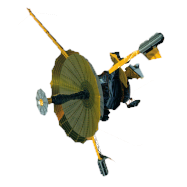The Galileo Energetic Particles Detector
Galileo EPD Handbook
Chapter 2. EPD Software
LGA Processing Software for the Energetic Particles Detector (continued)
Source: C. Brull and S. Stone, December 19, 1998
6. LGA2ASCII Overview
LGA2ASCII provides a method of extracting values from an LGA archive file. The program allows the user to specify a list of byte offsets and data types. LGA2ASCII extracts the data from the LGA archive file and creates an ASCII flat file. Each column represents an item on the specified list. A time string may also be included in the first column. The time format may be chosen from a default list, or may be specified by the user using C output format specifiers.
**Known deficiency of this document: "Need to include information on repeating offsets and relative offset." See other documents on this website.
Next: Appendix A. Revisions
Return to Galileo EPD Handbook Table of Contents Page.
Return to main
Galileo Table of Contents Page.
Return to Fundamental
Technologies Home Page.
Updated 8/23/19, Cameron Crane
QUICK FACTS
Mission Duration: Galileo was planned to have a mission duration of around 8 years, but was kept in operation for 13 years, 11 months, and 3 days, until it was destroyed in a controlled impact with Jupiter on September 21, 2003.
Destination: Galileo's destination was Jupiter and its moons, which it orbitted for 7 years, 9 months, and 13 days.



